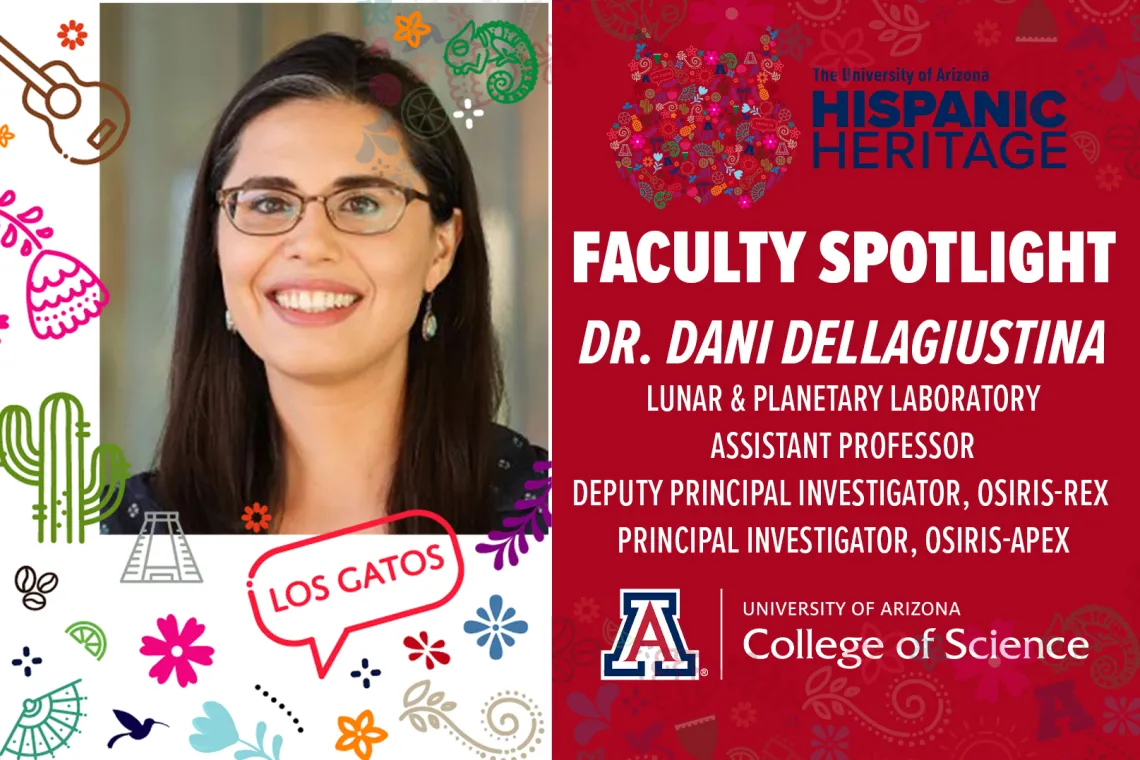Hispanic Heritage Month Faculty Spotlight: Dr. Dani DellaGiustina

The College of Science is celebrating Hispanic Heritage Month by featuring some of the College’s outstanding faculty with Hispanic roots. Our next featured faculty member is Dr. Dani DellaGiustina, an Assistant Professor in the Lunar & Planetary Laboratory, Deputy Principal Investigator for OSIRIS-REx, and Principal Investigator for OSIRIS-APEX.
The College of Science spoke with Dr. DellaGiustina to learn more about her journey to the University of Arizona, the importance of family, and her mentors that helped guide her to where she is today.
You can learn more about Dr. DellaGiustina and her work here.
Dr. Dani DellaGiustina
Assistant Professor
Deputy Principal Investigator, OSIRIS-REx
Principal Investigator, OSIRIS-APEX
Lunar & Planetary Laboratory
College of Science: Tell us a little about yourself, your background, and your journey to the University of Arizona.
DellaGiustina: I grew up and went to high school in El Paso, TX, but I never felt very drawn to the sciences. But in order to fulfill general education requirements, I took an astronomy course during my first year of community college in El Paso. What I learned in that class blew my mind, and I knew I wanted to study space sciences. I transferred to the University of Arizona the next year to pursue a degree in physics and a minor in planetary sciences, and that's when I first connected with the Lunar and Planetary Laboratory. I left for some time to get a master's degree and work outside academia. But eventually, I returned to UArizona, to work full-time as a scientist and pursue a Ph.D. in Geosciences. I started as an undergrad research assistant at the Lunar and Planetary Laboratory and have slowly climbed to the ranks of Assistant Professor and NASA mission Principal Investigator! I’m grateful that UArizona provided me the opportunities to take this path.
COS: When looking back on your childhood and spending time with family, are there any favorite traditions or memories that stick out to you?
DellaGiustina: My Abuelo played a significant role in my childhood. The tradition of oral storytelling was a big part of our time together; he loved spending hours recounting how different his early life was from mine. As the child of migrant workers, his life was transient, and he began working in the fields at a young age. He also had wild and supernatural stories about traveling throughout the borderlands and living in haunted spaces. Looking back, these stories sowed seeds of gratitude and wonder in me early in life. I grew up understanding that my roots were humble and that this world--especially the desert southwest--was a magical place.
COS: Who are some of the people who have made the greatest impact on your life?
DellaGiustina: My mother worked and put herself through college while I was a child, eventually receiving a bachelor's and master's degree. Seeing this at a young age showed me the importance of education and the grit required to balance family, schooling, and work. Looking back, I'm unsure how she did it, and witnessing her perseverance and grace throughout it all significantly impacted me.
At UArizona, I have also had some incredible mentors. Dante Lauretta (OSIRIS-REx Principal Investigator) and I met when I was a first-year student at UArizona. We've worked together ever since. He has continually believed in me and was always willing to give a platform to my crazy ideas. Some of those crazy ideas have translated into multi-million-dollar awards from NASA.
COS: What was it that drew you to your area of research and expertise?
DellaGiustina: I love wild landscapes and have always felt drawn to strange places--deserts, polar ice sheets, and alpine environments. As a planetary scientist, I often look at images of strange landforms on planetary bodies throughout the solar system. I have always loved imagining myself standing in these places, and something about imagining myself in other worlds is a profound source of inspiration.
COS: What is your favorite part of being a scientist?
DellaGiustina: Making discoveries! Seeing things--whether in images of an asteroid's surface or seismic profiles from the polar ice sheets--that no human has ever seen before me. The feeling of expanding the boundaries of human knowledge is one of the best parts of being a scientist.

